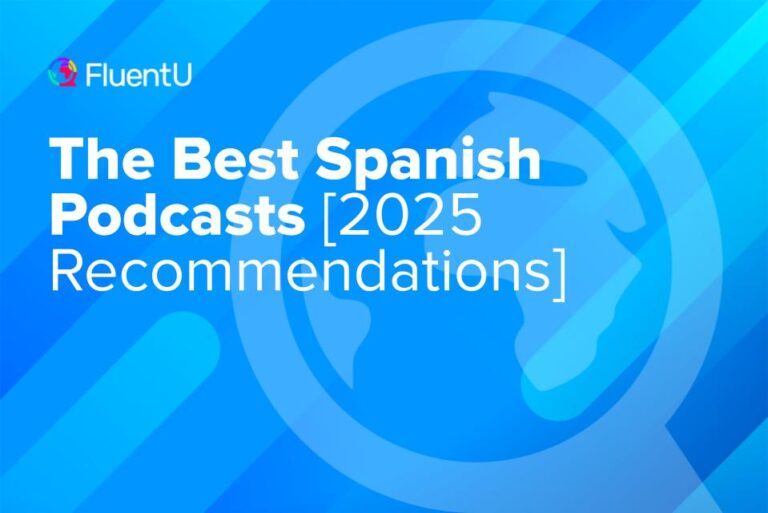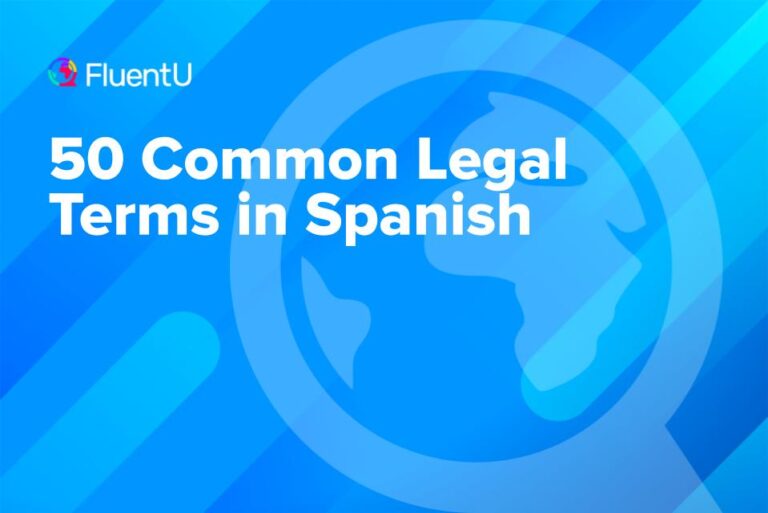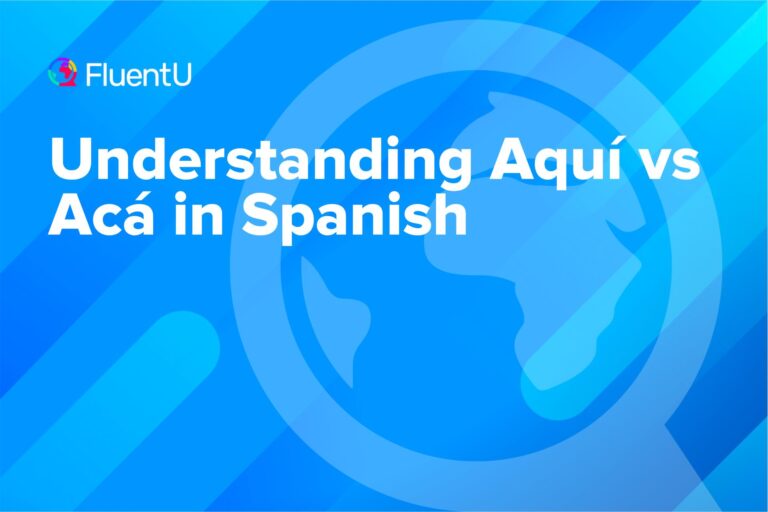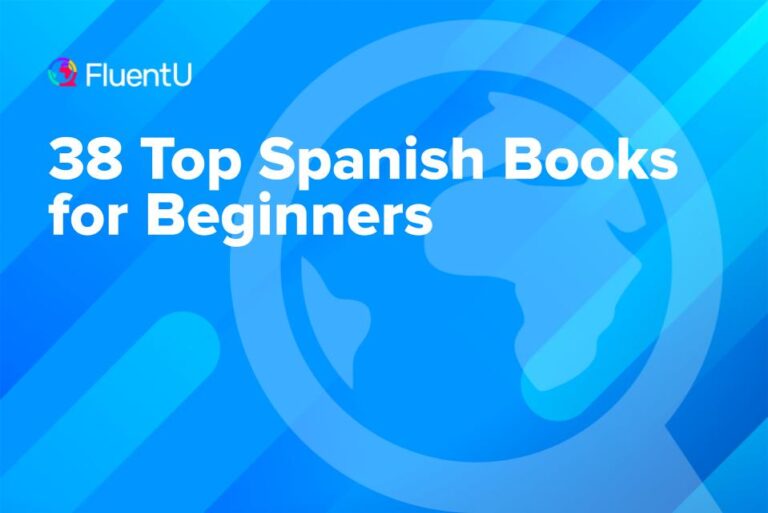Contents
- Most Common Phrases to Learn First
- Spanish Greetings
- Questioning in Spanish
- Asking for Help in Spanish
- Talking About Time in Spanish
- Travel Spanish Phrases
- Spanish Phrases for Shopping
- Spanish Phrases for Small Talk
- Expressions, Filler Words and Phrases in Spanish
- Getting to Know People in Spanish
- Spanish Phrases for Celebrations
- Spanish Farewells
- Resources for Practicing New Vocabulary
- And One More Thing…
143 Spanish Phrases for Talking About Almost Anything
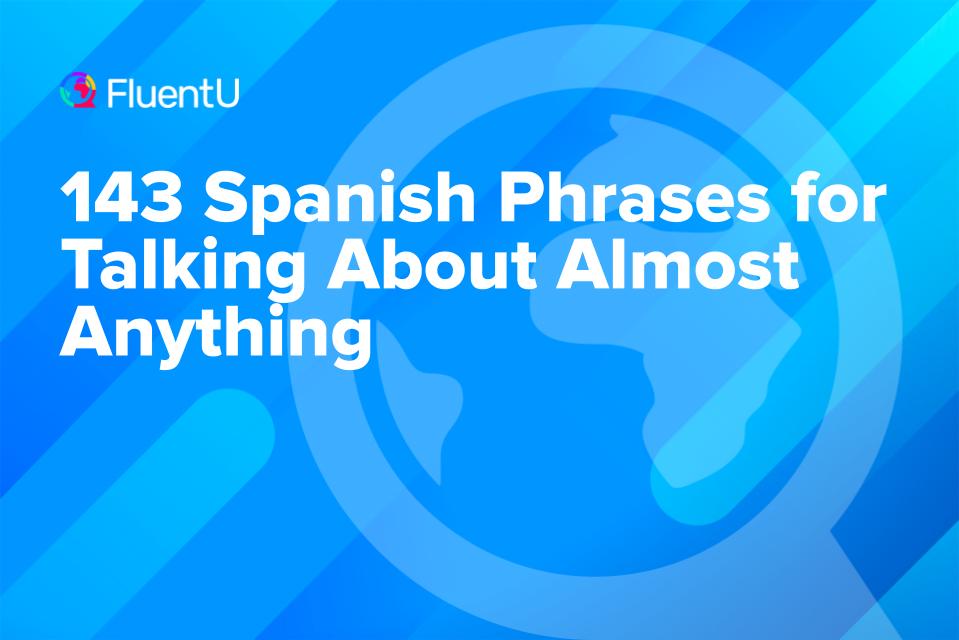
No matter what level you are, having conversations in Spanish is an incredibly useful way to improve your language skills. You can have your first-ever conversation today, too—by learning a few simple but very useful Spanish phrases.
These 143 common Spanish phrases will allow you to have an actual conversation, even if you don’t feel like you know much Spanish.
Download: This blog post is available as a convenient and portable PDF that you can take anywhere. Click here to get a copy. (Download)
Most Common Phrases to Learn First

1. Hola — Hello
Hola, me llamo Jorge. — Hello, my name is Jorge.
2. ¿Cómo estás? , ¿Qué tal? / ¿Cómo está usted? — How are you? (informal/formal)
Hola, ¿cómo estás? — Hello, how are you?
Hola amigo, ¿qué tal? — Hi friend, how are you/what’s up?
Hola, me llamo Jorge. ¿Cómo está usted? — Hello, my name is Jorge. How are you?
3. ¿Hablas inglés? / ¿Habla inglés? — Do you speak English? (informal/formal)
Lo siento, no hablo español. ¿Hablas inglés? — I’m sorry, I don’t speak Spanish. Do you speak English?
¿Habla inglés? ¡Necesito ayuda! Es una emergencia. — Do you speak English? I need help! It’s an emergency.
4. No entiendo — I don’t understand
¿Qué has dicho? No entiendo. — What did you say? I don’t understand.
5. ¿Cómo te llamas? / ¿Cómo se llama usted? — What’s your name? (informal/formal)
Hola, ¿cómo te llamas? — Hello, what’s your name?
Buenas tardes, ¿cómo se llama usted? — Good afternoon, what is your name?
6. Habla más despacio, por favor / Hable más despacio, por favor — Please speak slower (informal/formal)
¡Miguel, estás hablando muy rápido! Habla más despacio, por favor. — Miguel, you’re speaking very fast! Please speak slower.
Lo siento, no entiendo. Hable más despacio, por favor. — I’m sorry, I don’t understand. Please speak slower.
7. ¿Podrías repetirlo, por favor? / ¿Podría repetirlo, por favor? — Could you repeat that, please? (informal/formal)
No entiendo lo que dices. ¿Podrías repetirlo, por favor? — I don’t understand what you’re saying. Could you repeat it, please?
No puedo recordar el último dígito de su número de teléfono. ¿Podría repetirlo, por favor? — I can’t remember the last digit of your phone number. Could you repeat it, please?
8. Me llamo… — My name is…
Me llamo Selena. — My name is Selena.
9. Adiós — Goodbye
Tengo que ir al supermercado. ¡Adiós! — I have to go to the supermarket. Bye!
10. Sí — Yes
¡Sí, hablo español! — Yes, I speak Spanish!
11. No — No
Lo siento, no hablo inglés. — Sorry, I don’t speak English.
12. Gracias — Thank you
Gracias por hablar más despacio. — Thank you for speaking slower.
13. De nada — You’re welcome
A: Gracias por hablar más despacio. — Thank you for speaking slower.
B: ¡De nada! — You’re welcome!
14. Por favor — Please
Háblame solamente en español, por favor. — Only speak to me in Spanish, please.
15. Disculpa / Disculpe — Excuse me (to get someone’s attention) (informal/formal)
Disculpe, ¿sabes cómo llegar al banco? — Excuse me, do you know how to get to the bank?
16. Perdón — Excuse me (to excuse yourself)
Perdón, no puedo escucharte. — Excuse me/pardon me, I can’t hear you.
17. Lo siento — I’m sorry
Lo siento, ahorita estoy ocupado. — Sorry, I’m busy right now.
18. ¿Dónde está el baño? — Where’s the bathroom?
Disculpe, ¿dónde está el baño? — Excuse me, where is the bathroom?
19. No sé — I don’t know
No sé si pueda ir a la fiesta esta noche. — I don’t know if I can go to the party tonight.
Spanish Greetings

20. Buenos días — Good morning/good day
Buenos días, bienvenido al restaurante. — Good morning, welcome to the restaurant.
21. Buenas tardes — Good afternoon
Buenas tardes, ¿qué desean ordenar? — Good afternoon, what would you like to order?
22. Buenas noches — Good evening/goodnight
Buenas noches y buen viaje. — Goodnight and safe travels.
23. ¡Bienvenido! / ¡Bienvenida! — Welcome! (masculine/feminine)
Bienvenido a mi casa. — Welcome to my home! (said to a man)
Bienvenida a mi casa. — Welcome to my home! (said to a woman)
24. Encantado de conocerte / Encantada de conocerte — Nice to meet you (masculine/feminine) (Spain)
Encantado de conocerte. — Nice to meet you. (said by a man)
Encantada de conocerte. — Nice to meet you. (said by a woman)
25. Mucho gusto — Nice to meet you (Latin America)
Me llamo Pablo, ¡mucho gusto! — My name is Pablo, nice to meet you!
26. Un gusto — A pleasure (to meet you)
Qué tal, soy Alberto, un gusto. — Hello, I’m Alberto, it’s a pleasure to meet you.
El gusto es mío. — The pleasure is mine.
27. ¿Cómo has estado? — How have you been?
¡Hace tiempo que no nos vemos! ¿Cómo has estado? — Long time no see! How have you been?
28. ¿Cómo te va? — How’s it going?
¡Hola, amiga!, ¿cómo te va? — Hi, friend! How’s it going?
29. ¿Qué pasa? — What’s up?
¿Qué pasa, tío? — What’s up, man?
For more greetings in Spanish, check out this post.
Questioning in Spanish

30. Por qué — Why
¿Por qué dices eso? — Why are you saying that?
31. Para qué — Why, what for
¿Para qué es esta herramienta? — What is this tool for?
32. Quién — Who
¿Quién es ella? — Who is she?
33. Qué — What
¿Qué haces? — What are you doing?
34. Cuál — Which
¿Cuál es el mío? — Which one is mine? (masculine)
¿Cuál es la mía? — Which one is mine? (feminine)
35. Dónde — Where
¿Dónde está mi libro? — Where is my book?
36. Cuándo — When
¿Cuándo nos vamos? — When are we leaving?
37. Cómo — How
¿Cómo vamos a llegar a casa? — How are we getting home?
¿Cómo se llama? — What is his/her/your name?
Note that cómo means “what” when asking for someone’s name. That’s because ¿Cómo se llama? can literally be translated as “how does he call himself?”
Asking for Help in Spanish

38. Necesito ayuda — I need help
Disculpe, necesito ayuda para encontrar mi hotel. — Excuse me, I need help finding my hotel.
39. ¿Puedes ayudarme? / ¿Puede ayudarme? — Can you help me? (informal/formal)
No entiendo mi tarea de la clase de español. ¿Puedes ayudarme? — I don’t understand my homework from Spanish class. Can you help me?
Disculpe, señor. Es la primera vez que uso el metro de Madrid y necesito ir a Nuevos Ministerios, pero no sé qué línea tomar. ¿Puede ayudarme? — Excuse me, sir. It’s my first time using the Madrid metro and I need to go to Nuevos Ministerios, but I don’t know which line to take. Can you help me?
40. Estoy perdido / Estoy perdida — I’m lost (masculine/feminine)
¡Ayúdame! Estoy perdido. — Help me! I’m lost. (masculine)
¡Ayúdame, por favor! Estoy perdida. — Help me, please! I’m lost. (feminine)
41. ¿Qué significa…? / ¿Qué quiere decir…? — What does … mean?
¿Qué significa esa palabra? Nunca la había escuchado. — What does that word mean? I’d never heard of it.
¿Qué quiere decir “estacionamiento”? — What does “estacionamiento” mean?
42. ¿Puedes repetir eso? / ¿Puede repetir eso? — Can you repeat that? (informal/formal)
No puedo escucharte muy bien por el ruido. ¿Puedes repetir eso? — I can’t hear you very well due to the noise. Can you repeat that?
¿Puede repetir eso, por favor? Lo voy a anotar por si acaso. — Can you repeat that, please? I’m going to write it down just in case.
43. ¿Puedes mostrarme dónde está… ? / ¿Puede mostrarme dónde está… ? — Can you show me where to find… ? (informal/formal)
Disculpa, ¿puedes mostrarme dónde está la universidad? — Excuse me, can you show me where’s the university?
Buenas tardes, señor. ¿Puede mostrarme dónde está el formulario para poder rellenarlo en casa? — Good afternoon, sir. Can you show me where the form is so I can fill it out at home?
44. ¿Me puedes explicar…? / ¿Me puede explicar…? — Can you explain … to me? (informal/formal)
No entiendo esta oración. ¿Me la puedes explicar? — I don’t understand this sentence. Can you explain this to me?
Profesora, ¿me puede explicar la actividad, por favor? — Teacher, can you please explain the activity (to me)?
45. ¡Rápido! — Quick!
¡Rápido! Vamos a llegar tarde. — Quick! We’re going to be late.
Talking About Time in Spanish

46. ¿Qué hora es? — What time is it?
Disculpa, ¿Qué hora es? — Excuse me, what time is it?
47. ¿A qué hora es…? — What time is …?
¿A qué hora es la clase de español? — What time is the Spanish class?
48. Es la… / Son las… — It’s …
Es la una de la tarde. — It’s one (o’clock) in the afternoon.
Son las siete de la noche. — It’s seven (o’clock) at night.
Note that only the number one (una) uses the verb es (singular) to tell the time. All the other numbers use son (plural).
49. A la… / A las… — At …
La clase es a la una. — The class is at one (o’clock).
La fiesta empieza a las ocho. — The party starts at eight (o’clock).
50. ¡Siento llegar tarde! — Sorry I’m late!
¡Siento llegar tarde! Hay demasiado tráfico. — Sorry I’m late! There’s too much traffic.
51. Me tengo que ir. — I have to go.
Lo siento, pero ahora me tengo que ir. — Sorry, but I have to go now.
If you want to go deeper into learning how to tell time in Spanish, I highly recommend checking out this more in-depth guide here.
Travel Spanish Phrases

52. Más adelante — Straight ahead
El hotel está más adelante. — The hotel is straight ahead.
53. A la izquierda — To the left
La universidad está a la izquierda. — The university is to the left.
54. A la derecha — To the right
El restaurante está a la derecha. — The restaurant is to the right.
55. A la vuelta — Around the corner
El banco está a la vuelta. — The bank is around the corner.
56. Quisiera reservar una mesa para … personas. — I would like to reserve a table for … people.
¡Hola! Quisiera reservar una mesa para cinco personas. — Hello! I’d like to reserve a table for five people.
57. Una mesa para dos, por favor. — A table for two please.
Buenas tardes, una mesa para dos, por favor. — Good afternoon, a table for two, please.
58. La carta, por favor. — The menu, please.
Disculpe, la carta, por favor. — Excuse me, the menu, please.
Another word often used to say “menu” is menú .
59. Quisiera… — I would like…
Quisiera una ensalada y una copa de vino tinto, por favor. — I would like a salad and a glass of red wine, please.
60. ¿Me trae un / una … , por favor? — Can you bring me a … , please?
¿Me trae una pasta a la boloñesa, por favor? — Can you bring me a pasta bolognese, please?
61. ¿Le pido un / una … ? — Can I ask you for a… ? (formal)
¿Le pido un sándwich de pollo? — Can I ask you for a chicken sandwich?
62. Una cerveza, por favor. — A beer, please.
Quisiera una cerveza, por favor. — I’d like a beer, please.
63. Una copa de vino, por favor. — A glass of wine, please.
Me gustaría una copa de vino, por favor. — I’d like (to have) a glass of wine, please.
64. Tengo hambre. — I am hungry.
¿A qué hora vamos a comer? ¡Tengo hambre! — What time are we going to eat? I’m hungry!
65. Tengo sed. — I am thirsty.
¿Podría darme un vaso de agua, por favor? Tengo sed. — Can I have a glass of water, please? I’m thirsty.
66. Soy vegetariano / Soy vegetariana — I am vegetarian (masculine/feminine)
No como carne porque soy vegetariano. — I don’t eat meat because I’m vegetarian.
67. ¿A qué hora llega el tren / el autobús? — What time does the train/bus arrive?
Disculpe, ¿a qué hora llega el tren a Barcelona? — Excuse me, what time does the train arrive in Barcelona?
68. ¿A qué hora sale el tren / el autobús? — What time does the train/bus leave?
¿A qué hora sale el último autobús a Granada? — Excuse me, what time does the last train to Granada leave?
69. Un billete sencillo para … , por favor / Un pasaje de ida para … , por favor — A single ticket for… , please.
Necesito un billete sencillo para Lima, por favor. — I need a single ticket to/for Lima, please.
Necesito un pasaje de ida para Lima, por favor. — I need a single ticket to/for Lima, please.
70. Un billete de ida y vuelta para … , por favor / Un pasaje de ida y vuelta para…, por favor — A round trip ticket for … , please.
Quisiera un pasaje de ida y vuelta para Puerto Vallarta, por favor. — I would like a round trip ticket to/for Puerto Vallarta, please.
71. Buen viaje — Safe travels
¡Buen viaje y que te diviertas! — Safe travels and have fun!
72. Felices vacaciones — Have a great holiday
¡Adiós y felices vacaciones! — Goodbye and have a great holiday!
Spanish Phrases for Shopping

73. ¿Puedo probarme… ? — Can I try this on?
¿Puedo probarme este vestido rojo? — Can I try on this red dress?
74. ¿Hasta qué hora está abierto? — Until what time is it open?
¿Hasta qué hora está abierto el restaurante? — Until what time is the restaurant open?
75. ¿Qué precio tiene … ? — What is the price of … ?
¿Qué precio tiene la camiseta? — What is the price of the T-shirt?
76. ¿Es el mejor precio que me da? — Is that the best price you can do?
Está demasiado caro. ¿Es el mejor precio que me da? — It’s too expensive. Is that the best price you can do?
77. Puedo darle… — I can give you… (formal)
Puedo darle quince dólares. — I can give you $15.
Spanish Phrases for Small Talk

78. Bien, gracias — Good, thanks
Estoy bien, gracias. — I’m good, thanks.
79. Muy bien — Very well
Ella está muy bien. — She is (doing) great.
80. Todo bien — All good
Sí. Todo bien, gracias — Yes. All is good/well, thanks.
81. Estoy cansado / Estoy cansada — I’m tired (masculine/feminine)
Estoy un poco cansado porque anoche me acosté a las doce. — I’m a little tired because I went to bed at 12 last night.
82. Estoy enfermo / Estoy enferma (masculine/feminine)
Lo siento, no puedo salir. Estoy enferma. — Sorry, I can’t go out. I’m sick.
83. No puedo quejarme. — I can’t complain.
No puedo quejarme, todo está bien. — I can’t complain, all is well.
84. Más o menos — So-so
A: ¿Cómo estás? — How are you?
B: Más o menos. — So-so.
85. Bien, ¿y tú? / Bien, ¿y usted? — Good, and you? (informal/formal)
¡Estoy bien, gracias! ¿Y tú? — I’m good, thanks! And you?
¡Estoy bien, gracias! ¿Y usted? — I’m good, thanks! And you?
86. Mal — Bad
Me siento muy mal. Creo que debería hablar con el médico. — I feel very bad. I think I should talk to the doctor.
87. ¿Cuánto cuesta…? — How much does … cost?
¿Cuánto cuesta esta chaqueta? — How much does this jacket cost?
88. ¿Vamos a tomar una copa? — Shall we go for a drink?
¿Vamos a tomar una copa? ¡Quiero salir esta noche! — Shall we go for a drink? I want to go out tonight!
89. ¿Quieres ver una película? — Do you want to see a movie?
¿Quieres ver una película este fin de semana? — Do you want to see a movie this weekend?
90. ¿Vienes a menudo? — Do you come here often?
Esta discoteca es mi favorita. ¿Vienes a menudo? — This club is my favorite. Do you come here often?
91. ¿Qué tal este clima? — How about this weather?
¿Qué tal este clima? Por fin hace más frío. — How about this weather? It’s finally getting colder.
A few responses are:
¡Hace mucho calor hoy! — It’s so hot today!
Hace mucho frío afuera. — It’s freezing outside.
92. ¿Has leído algún buen libro últimamente? — Have you read any good books lately?
¿Has leído algún buen libro últimamente? Necesito recomendaciones. — Have you read any good books lately? I need recommendations.
93. ¿Has visto esa nueva película? — Have you seen that new movie?
¿Has visto esa nueva película? Fui al cine para verla con mi mejor amigo. — Have you seen that new movie? I went to the movie theater to watch it with my best friend.
94. ¿A dónde te gustaría viajar? — Where would you like to travel?
Si tú puedes ir dondequiera, ¿a dónde te gustaría viajar? — If you could go anywhere, where would you like to travel?
95. ¿Cuál es el trabajo de tus sueños? — What is your dream job?
A: ¿Cuál es el trabajo de tus sueños? — What is your dream job?
B: El trabajo de mis sueños es ser médico. — My dream job is to be a doctor.
Expressions, Filler Words and Phrases in Spanish

96. A ver — Let’s see
A: Disculpe, ¿a qué hora llega el próximo tren? — Excuse me, what time does the next train come?
B: A ver… a las siete de la tarde. — Let’s see… at 7 p.m.
97. ¿En serio? — Seriously?
A: Rompí con mi novio ayer. — I broke up with my boyfriend yesterday.
B: ¿En serio? ¿Por qué? — Seriously? Why?
98. Dios mío — Oh my God
¡Dios mío! ¡Voy a llegar tarde otra vez! — Oh my God! I’m going to be late again!
99. ¿De verdad? — Really?
A: Yo renuncié a mi trabajo. — I quit my job.
B: ¿De verdad? ¡No me lo puedo creer! — Really? I can’t believe it!
100. No pasa nada — Don’t worry about it
A: Lo siento, tuve que reprogramar la cita. — Sorry, I had to reschedule the appointment.
B: No pasa nada. — Don’t worry about it.
101. No hay problema — No problem
A: Gracias por ayudarme a aprender español. — Thanks for helping me learn Spanish.
B: ¡No hay problema! — No problem!
102. Por supuesto — Of course
A: ¿Vas a ir a la fiesta? — Are you going to go to the party?
B: ¡Por supuesto! ¡Es la fiesta de mi mejor amigo! — Of course! It’s my best friend’s party!
103. ¡No te preocupes! — Don’t worry!
A: Lo siento, no hablo mucho español. — Sorry, I don’t speak much Spanish.
B: ¡No te preocupes! Puedo ayudarte. — Don’t worry! I can help you.
104. Así que… / Entonces… — So…
Así que… ¿adónde quieres ir? — So… where do you want to go?
Entonces… ¿qué quieres comer? — So… what do you want to eat?
105. Pues — Well
Pues me tengo que ir pronto. — Well, I have to leave soon.
106. Bueno — Well then
Bueno, vamos a la fiesta — Well then, let’s go to the party.
107. Es una lástima — That’s a shame
A: Lo siento, no quiero salir esta noche. Estoy cansada. — I’m sorry, I don’t want to go out tonight. I’m tired.
B: Es una lástima. — That’s a shame.
108. ¡Suerte! / ¡Buena Suerte! — Good luck!
¿Tienes una entrevista hoy? ¡Suerte! — You have an interview today? Good luck!
Learning filler words is a great way to make your Spanish sound more natural! Click here to learn more!
Getting to Know People in Spanish

109. ¿De dónde eres? , ¿De dónde sos? / ¿De dónde es usted? — Where are you from? (informal/formal)
¡Hablas español muy bien! ¿De dónde eres? — You speak Spanish very well! Where are you from?
Hola, me llamo Esperanza y soy de Lima. ¿De dónde es usted? — Hello, my name is Esperanza and I’m from Lima. Where are you from?
Some countries like Argentina and Uruguay use vos instead of tú. In those places, you’d say ¿De dónde sos?
110. Soy de… — I’m from… [country]
Soy de los Estados Unidos. — I’m from the United States.
111. Soy… — I’m… [nationality]
Soy venezolano. — I’m Venezuelan. (masculine)
Soy mexicana. — I’m Mexican. (feminine)
If you don’t know how to say your nationality, check this post about talking about different nationalities in Spanish.
112. ¿Qué haces? / ¿A qué te dedicas? — What do you do (for work)?
Encantado de conocerte. ¿A qué te dedicas? — It’s a pleasure to meet you. What do you do for work?
To answer this question, you’d reply with soy… plus your job title in Spanish.
Soy profesor de inglés. — I’m an English teacher.
113. ¿Qué te gusta hacer en tu tiempo libre? — What do you like to do in your free time?
[fluentu-tts engine=”neural” voice=”Lupe”] ¿Qué te gusta hacer en tu tiempo libre?[/fluentu-tts] — What do you like to do in your free time?
114. Me gusta… — I like…
To use this as an answer to the previous question, simply add a verb after me gusta to say what you like to do.
[fluentu-tts engine=”neural” voice=”Lupe”]Me gusta leer y jugar fútbol.[/fluentu-tts] — I like to read and play soccer.
115. ¿Cuál es tu película favorita? — What’s your favorite movie?
Quiero ver una película. ¿Cuál es tu película favorita? — I want to watch a movie. What’s your favorite movie?
116. ¿Cuál es tu libro favorito? — What’s your favorite book?
¡Tú lees todo el tiempo! ¿Cuál es tu libro favorito? — You read all the time! What’s your favorite book?
117. ¿Cuál es tu banda favorita? — What’s your favorite band?
Me gusta escuchar música. ¿Cuál es tu banda favorita? — I like listening to music. What’s your favorite band?
118. Mi película favorita es… / Mi libro favorito es… / Mi banda favorita es… — My favorite movie/book/band is…
Mi película favorita es “Los Muertos.” — My favorite movie is “Los Muertos.”
Mi libro favorito es “La casa de los espíritus”, escrito por Isabel Allende. — My favorite book is “The House of the Spirits,” written by Isabel Allende.
Mi banda favorita es Morat. — My favorite band is Morat.
119. ¿Tienes hermanos o hermanas? — Do you have any brothers or sisters?
A: ¿Tienes hermanos o hermanas? — Do you have any brothers or sisters?
B: Sí, tengo dos hermanos y dos hermanas. — Yes, I have two brothers and two sisters.
120. ¿Estás casado? / ¿Estás casada? — Are you married? (masculine/feminine)
A: ¿Estás casada? — Are you married?
B: Sí, estoy casada. Mi marido se llama Miguel. — Yes, I’m married. My husband is called Miguel.
121. ¿Tienes hijos? — Do you have children?
A: ¿Tienes hijos? — Do you have kids?
B: No, no tengo hijos. — No, I don’t have kids.
122. ¿Qué edad tienen tus hijos? — How old are your children?
¿Qué edad tienen tus hijos? ¡Se ven muy jóvenes! — How old are your kids? They look very young!
123. ¿Tus hijos aún viven en casa? — Do your children still live at home?
A: ¿Tus hijos aún viven en casa? — Do your children still live at home?
B: Mi hijo vive en los Estados Unidos y mi hija aún vive en casa. — My son lives in the United States and my daughter still lives at home.
124. ¿Tienes primos? — Do you have any cousins?
A: ¿Tienes primos? — Do you have cousins?
B: Sí, tengo muchos primos. — Yes, I have lots of cousins.
125. ¿Tienes sobrinas o sobrinos? — Do you have any nieces or nephews?
A: ¿Tienes sobrinas o sobrinos? — Do you have nieces or nephews?
B: Solo tengo sobrinas, no tengo sobrinos. — I only have nieces, I don’t have nephews.
126. ¿Tienes alguna mascota? — Do you have any pets?
A: ¿Tienes alguna mascota? — Do you have any pets?
B: Sí, tengo un gato y dos perros. — Yes, I have a cat and two dogs.
Spanish Phrases for Celebrations
127. ¡Feliz cumpleaños! — Happy Birthday!
¡Feliz cumpleaños! ¿Cuántos años tienes ahora? — Happy Birthday! How old are you now?
128. ¡Feliz aniversario! — Happy Anniversary!
¡Feliz aniversario! ¿Cuántos años ustedes han estado casados? — Happy anniversary! How many years have you (plural) been married?
129. ¡Feliz San Valentín! — Happy Valentine’s Day!
¡Hoy es el catorce de febrero! ¡Feliz San Valentín! — Today is February 14th! Happy Valentine’s Day!
130. ¡Feliz Pascua! — Happy Easter!
¡Feliz Pascua! ¿Cómo vas a celebrar? — Happy Easter! How are you going to celebrate?
131. ¡Feliz Halloween! — Happy Halloween!
¡Feliz Halloween! ¿Cuál es tu disfraz este año? — Happy Halloween! What is your costume this year?
132. ¡Feliz Día de Acción de Gracias! — Happy Thanksgiving!
¡Feliz Día de Acción de Gracias a mis amigos estadounidenses! — Happy Thanksgiving to my American friends!
133. ¡Feliz Navidad! — Merry Christmas!
¡Feliz Navidad! Espero que tengas un buen día con tu familia. — Merry Christmas! I hope you have a good day with your family.
134. ¡Feliz Año Nuevo! — Happy New Year!
¡Feliz Año Nuevo! ¿Tienes metas nuevas para este año? — Happy New Year! Do you have new goals for this year?
135. ¡Feliz Día de los Reyes Magos! — Happy Epiphany/Three Kings!
¡Feliz Día de los Reyes Magos! ¿Qué planes tienes? — Happy Epiphany! What plans do you have?
136. ¡Salud! — Cheers!
¡Salud por tu ascenso! — Cheers to your promotion!
137. ¡Felicitaciones! / Felicidades — Congratulations!
¡Felicitaciones por tu graduación! — Congratulations on your graduation!
In Spain, it’s also common to hear the word enhorabuena used to say “congratulations.”
Spanish Farewells

138. Hasta luego — See you later
Bueno, fue un gusto verte. ¡Hasta luego! — Well, it was good to see you. See you later!
139. Hasta la próxima — Until next time
Buen trabajo hoy. ¡Hasta la próxima! — Good job today. See you next time!
140. Te veo… — I’ll see you…
Te veo el lunes. — I’ll see you Monday.
141. Nos vemos — See you
Nos vemos el viernes. — See you Friday.
142. Feliz día — Have a good day
Adiós, y feliz día. — Bye, and have a good day.
143. ¡Cuídate! — Take care!
Me tengo que ir. ¡Cuídate! — I have to go. Take care!
Resources for Practicing New Vocabulary
This post can certainly serve as a cheat sheet during your conversations with language partners, but you’ll also want to commit these powerful Spanish phrases to memory.
Here are a few resources that make it easy to do so.
Anki is a spaced repetition software (SRS) app and website that lets you create your own flashcard decks and import decks created by other users.
FluentU takes authentic videos—like music videos, movie trailers, news and inspiring talks—and turns them into personalized language learning lessons.
You can try FluentU for free for 2 weeks. Check out the website or download the iOS app or Android app.
P.S. Click here to take advantage of our current sale! (Expires at the end of this month)

We also have a YouTube channel that has lessons based on pop culture and conversational basics:
With this app and website, you can create “notebooks” and add as many pages to them as you want, which is especially useful if you’re busy or tend to learn Spanish online. Building new sentences or stories around these words can help you grasp their meaning more quickly, too.
With these Spanish phrases under your belt, you don’t have to wait months to start having conversations. Get out there and practice today!
Download: This blog post is available as a convenient and portable PDF that you can take anywhere. Click here to get a copy. (Download)
And One More Thing…
If you've made it this far that means you probably enjoy learning Spanish with engaging material and will then love FluentU.
Other sites use scripted content. FluentU uses a natural approach that helps you ease into the Spanish language and culture over time. You’ll learn Spanish as it’s actually spoken by real people.
FluentU has a wide variety of videos, as you can see here:

FluentU brings native videos within reach with interactive transcripts. You can tap on any word to look it up instantly. Every definition has examples that have been written to help you understand how the word is used. If you see an interesting word you don’t know, you can add it to a vocab list.

Review a complete interactive transcript under the Dialogue tab, and find words and phrases listed under Vocab.

Learn all the vocabulary in any video with FluentU’s robust learning engine. Swipe left or right to see more examples of the word you’re on.

The best part is that FluentU keeps track of the vocabulary that you’re learning, and gives you extra practice with difficult words. It'll even remind you when it’s time to review what you’ve learned. Every learner has a truly personalized experience, even if they’re learning with the same video.
Start using the FluentU website on your computer or tablet or, better yet, download the FluentU app from the iTunes or Google Play store. Click here to take advantage of our current sale! (Expires at the end of this month.)



